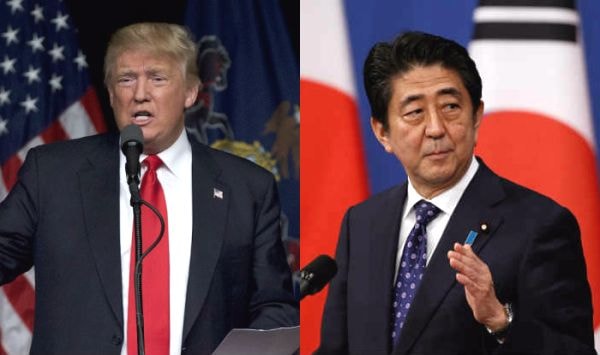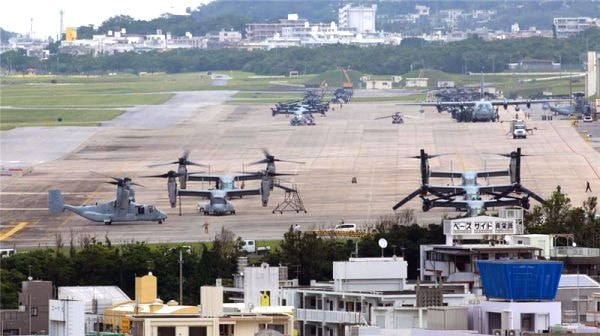Shinzo Abe - Donald Trump: A test for both
(Baonghean) - Less than 10 days after the US presidential election, Japanese Prime Minister Shinzo Abe is scheduled to visit the US on November 17 and have his first meeting with President-elect Donald Trump. The Japanese Prime Minister meeting with the newly elected US President before taking office is an unprecedented event. This hasty meeting is considered a test for both.
The Trump Effect in Tokyo
While many members of Mr. Abe's government were still shocked by the US election results, one day later, the Japanese Prime Minister immediately had a phone call with newly elected US President Donald Trump.
Mr. Abe congratulated billionaire Trump and expressed his belief that under his leadership, America will surely become greater. They also quickly set the first meeting in New York on November 17.
The moves by the Japanese leader have raised a lot of curiosity. However, there are many reasons to explain this hasty meeting.
It is possible that Prime Minister Abe wants to take advantage of the time to create a close personal relationship between the two leaders of the two allied countries. Before that, Japan was said to have predicted that former Secretary of State Hillary Clinton would be the next owner of the White House.
Just a few days before the US election, government officials revealed to the Japanese media that Mr. Abe planned to visit Washington in February 2017 to meet with Mrs. Clinton. Earlier, in September, Prime Minister Abe also visited the US and only met with Mrs. Clinton. This is also unprecedented for a Prime Minister to meet with a presidential candidate.
 |
| Japanese Prime Minister Shinzo Abe (right) and President-elect Donald Trump. Photo: AP |
It could also be a way to assess the veracity of Mr. Trump’s campaign statements regarding Japan, which have raised concerns in Tokyo about a rift in its alliance with Washington. During his campaign, Mr. Trump caused a stir in Japan and South Korea by saying he wanted the two countries to pay more for continued US defense assistance.
Currently, about 50,000 US troops are still stationed in Japan. Although the Japanese government has paid a voluntary fee (about $1.9 billion) every year to support US troops, Mr. Trump still believes that this amount is not satisfactory for the financial burden of the military that the Pentagon is facing. Mr. Trump even complained that the US-Japan relationship is "one-sided", the US has to shoulder too much burden, while the world's third largest economy is the "free rider".
The concern of the Japanese is whether Mr. Trump will really ask Japan to pay more money, and if not, will the US withdraw its military forces from Japan?
Trump also suggested that Japan could become a nuclear power to counter North Korea, a suggestion that shocked many Japanese, who are the only victims of a nuclear attack in the world.
Not only that, President-elect Donald Trump also pledged to withdraw the US from the TPP on his first day in office. Currently, the “fate” of the TPP is extremely fragile. Republican lawmakers also affirmed that they will not put the TPP to a vote during the transition period and end negotiations until the new administration takes office.
This is what makes Prime Minister Abe’s government “restless”. In fact, the TPP cannot take effect without the approval of the US Congress and this failure will create a big gap in Mr. Abe’s economic development program.
Therefore, in addition to confirming the Japan-US relationship early in President-elect Donald Trump’s roadmap, Mr. Abe will “express his thoughts” to Mr. Trump on the “importance of free trade” during this visit, hoping that the new US administration will not “abandon” the agreement that Tokyo is looking forward to. In case the future owner of the White House insists on “throwing away the TPP,” Japan needs to quickly consider the option of “reviving” this agreement with the other 10 members.
Trump's test on Asia
On the other hand, the meeting between Prime Minister Abe and the newly elected US President will not only help Tokyo “decode” its doubts but also give Asian countries a first look at Mr. Trump’s future policy towards the continent. In other words, this will be the first test of Trump’s foreign policy towards Asia.
 |
| The US maintains a military base on the Japanese island of Okinawa. Photo: EPA. |
Many international experts believe that political views expressed during the election process will not necessarily be implemented when the candidates win the election. This may also happen in the case of Mr. Trump.
During the election campaign, Mr. Trump showed little regard for America's alliances in Asia, but immediately after the election results were announced, Mr. Trump "suddenly" changed his attitude and sought to reassure allies in Asia when he spoke by phone with Japanese Prime Minister Shinzo Abe and South Korean President Park Geun-hye. He strongly reaffirmed America's support for both allies. Mr. Trump also said that he appreciated Prime Minister Abe's economic policies and looked forward to working with the Japanese leader.
Observers say that Prime Minister Shinzo Abe is likely to continue leading Japan through 2021 thanks to a rule change in the Liberal Democratic Party. Therefore, the Donald Trump - Shinzo Abe relationship will be especially important for US policy in Asia.
At a time when key positions related to US foreign policy in Asia are still uncertain, the meeting with the Japanese Prime Minister could impact personnel decisions in Donald Trump's future administration.
Observers believe that Prime Minister Abe will likely lead the conversation with Mr. Trump in the direction he wants and focus on forming the basic outlines for the US-Japan alliance strategy in particular and Asia in general of the President-elect.
Thanh Huyen
